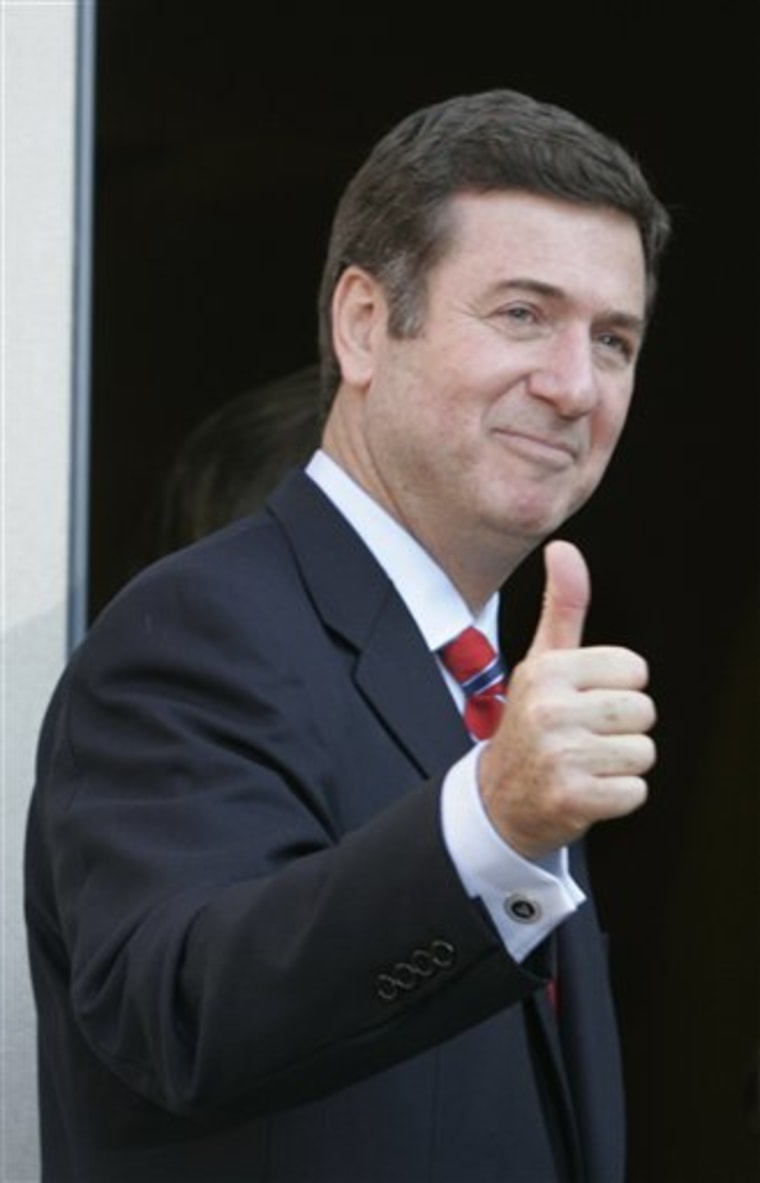Former Virginia Sen. George Allen addresses the six-letter slur that undid his 2006 campaign in a new book that applies lessons from sports to Washington politics and sets up what Republicans widely regard as a two-year bid to reclaim his Senate seat.
Allen, who lost his seat four years ago to Democrat Jim Webb, began media interviews and appearances Monday on conservative cable talk shows promoting "What Washington Can Learn from the World of Sports."
The former Virginia governor's book is full of athletics allegories and anecdotes from childhood in the home of Pro Football Hall of Fame coach George H. Allen. It is largely a compendium of points the tobacco-dipping, cowboy-booted Allen has made in conversations, interviews and speeches throughout three decades in Virginia politics. It hits store shelves this week.
In the first and last chapters, Allen addresses issues of race and ethnicity that have become the most indelible liabilities of his career. The book includes a short recap of his "Macaca" fumble that derailed what had seemed an easy 2006 re-election bid and prospects for the GOP presidential nomination two years later.
In August 2006, Allen pointed out a videographer paid by Webb's campaign to track Allen at campaign stops. At a rally before a mostly white crowd in far southwestern Virginia, Allen pointed out S.R. Sidarth, the American-born son of Indian immigrants.
"In the process I gave the young cameraman the unfortunate, made-up nickname of Macaca (or Makaka)," Allen writes in the book's final chapter. "I thought of it as a nonsense word. If I had known the nickname could be considered a racial slur, I would not have said it. But that is how it was characterized. The poor judgment was mine. I should never have dragged this young man into the debate when my real target was my opponent. I apologized to him, and take full responsibility for the remark and its aftermath, which should have been handled much better."
His campaign nose-dived afterward. Webb won his inaugural bid for office by 9,329 votes out of nearly 2.4 million cast.
Allen said in an Associated Press interview that he learned one enormous way the worlds of sports and cutthroat politics differ as a result of his macaca moment and from a 1994 speech in which he exhorted Republicans to challenge Democrats and, figuratively, "knock their soft teeth down their whiny throats."
"There are certain things best left in the locker room and the field of play and they're not appropriate for political discourse," he said. "When you're in public service, your mistakes are highlighted. It's one of the lessons I learned, sometimes the hard way."
Onetime superstar
Earlier, Allen described the "meritocracy" that formed his world as the son of a National Football League legend, and of knowing black superstar players such as Los Angels Rams great David "Deacon" Jones and seeing him succeed famously without regard to race. The Hall of Fame defensive end penned the book's foreword.
"Race, ethnicity, origins and religious persuasion did not matter. In fact, so 'unconscious' of race was my upbringing in a football family that, in a strange sort of way, I entered adulthood — and probably even public life — not fully comprehending the full gravity of our nation's struggle for racial equality," he writes in the first chapter.
George Mason University political scientist Mark Rozell said Allen is serving as "his own revisionist historian."
"Candidates often try to rehabilitate themselves and position themselves for a future run. I can't believe he just wanted to write this as a final word and then just fade away quietly," Rozell said.
As the Republican who brought his party back from Democratic domination in Virginia in 1993, he was long the state's undisputed GOP superstar. Since then, new Republicans have moved to the fore, including Gov. Bob McDonnell, a conservative who led a resounding statewide sweep for his party last fall.
Asked by the AP to comment on a 2012 rematch against Webb, Allen gave the same response he gives in his 178-page book: "Perhaps."
